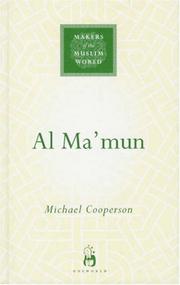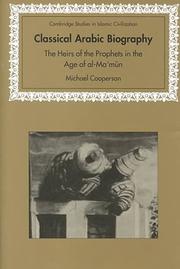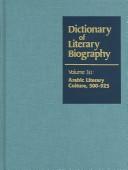| Listing 1 - 10 of 18 | << page >> |
Sort by
|

ISBN: 1851683860 9781851683864 Year: 2005 Publisher: Oxford : Oneworld,
Abstract | Keywords | Export | Availability | Bookmark
 Loading...
Loading...Choose an application
- Reference Manager
- EndNote
- RefWorks (Direct export to RefWorks)
Caliphs --- Abbasids --- Maʾmūn, --- Islamic Empire --- Kings and rulers --- History --- Biography --- Ma`mun --- Biography. --- Ma`mun, --- Ma'mun, --- Caliphs - Islamic Empire - Biography --- Maʾmūn, - Caliph, - 786-833 --- Islamic Empire - Kings and rulers - Biography --- Islamic Empire - History - 750-1258

ISBN: 1107118352 0521088542 0511150555 0511118120 0511310242 0511048858 0511497466 1280162341 0511008236 9780511008238 0511033613 9780511033612 9780511048852 9780511118128 9780521661997 0521661994 9780511497469 9780521088541 Year: 2000 Publisher: Cambridge Cambridge University press
Abstract | Keywords | Export | Availability | Bookmark
 Loading...
Loading...Choose an application
- Reference Manager
- EndNote
- RefWorks (Direct export to RefWorks)
Pre-modern Arabic biography has served as a major source for the history of Islamic civilization. In this 2000 study exploring the origins and development of classical Arabic biography, Michael Cooperson demonstrates how Muslim scholars used the notions of heirship and transmission to document the activities of political, scholarly and religious communities. The author also explains how medieval Arab scholars used biography to tell the life-stories of important historical figures by examining the careers of the Abbasid Caliph al- Ma'mun, the Shiite Imam Ali al-Rida, the Sunni scholar Ahmad Ibn Hanbal and the ascetic Bishr al-Hafi, each of whom represented a tradition of political and spiritual heirship to the Prophet. Drawing on anthropology and comparative religion, as well as history and literary criticism, the book considers how each figure responded to the presence of the others and how these responses were preserved by posterity.
Literature and history --- History and literature --- History and poetry --- Poetry and history --- History --- Islamic Empire --- Arab countries --- Arab Empire --- Empire, Islamic --- Middle East --- Muslim Empire --- Historiography. --- History and criticism. --- Biography --- Biography as a literary form --- Islamic literature, Arabic --- Islam --- Biographie (Genre littéraire) --- Littérature islamique arabe --- History and criticism --- Historiography --- Histoire et critique --- Historiographie --- Arts and Humanities
Book
ISBN: 1281937401 9786611937409 904742381X 9789047423812 9789004165731 9004165738 9781281937407 6611937404 Year: 2008 Publisher: Leiden ; Boston : Brill,
Abstract | Keywords | Export | Availability | Bookmark
 Loading...
Loading...Choose an application
- Reference Manager
- EndNote
- RefWorks (Direct export to RefWorks)
The volume brings together approaches to different elements of Arabic-Islamic civilization, mainly in the areas of linguistics, literature, literary theory, and prosody, but also including religion, ritual, economics, and zoology. Contributions also touch upon the adjacent areas of the Old Iranian, Persian, Greek and Byzantine written traditions. Some take as their points of departure specific Arabic words (cat, giraffe) or morphemes; others explore literary genres, subgenres (oration, ode, macaronic poem, travel narrative) or figures within them (the trickster, the devil). Cultural concepts such as wishing, gift-giving or discourse are treated, as are aspects of broader phenomena, such as the role of gender in dream interpretation or the relative merits of luxury goods and mass-produced commodities.
Arabic philology. --- Civilization, Arab. --- Arab civilization --- Civilization, Semitic --- Islamic civilization --- Arabic literature --- Philologie arabe --- Littérature arabe --- Civilisation arabe --- History and criticism --- Histoire et critique --- Heinrichs, Wolfhart.
Book
ISBN: 9780814771662 9780814738948 0814771661 081473894X 0814771955 0814737870 Year: 2013 Publisher: New York New York University Press
Abstract | Keywords | Export | Availability | Bookmark
 Loading...
Loading...Choose an application
- Reference Manager
- EndNote
- RefWorks (Direct export to RefWorks)
Ahmad ibn Hanbal (d. 241 H/855 AD), renowned for his profound knowledge of hadith—the reports of the Prophet’s sayings and deeds—is a major figure in the history of Islam. Ibn Hanbal’s piety and austerity made him a folk hero, especially after his principled resistance to the attempts of two Abbasid caliphs to force him to accept rationalist doctrine. His subsequent imprisonment and flogging became one of the most dramatic episodes of medieval Islamic history. Ibn Hanbal’s resistance influenced the course of Islamic law, the rise of Sunnism, and the legislative authority of the caliphate. Virtues of the Imam Ahmad ibn Hanbal is a translation of the biography of Ibn Hanbal penned by the Baghdad preacher, scholar, and storyteller, Ibn al-Jawzi (d. 597 H/1201 AD). It includes insights into Ibn Hanbal’s childhood, travels, and teachings, as well as descriptions of his way of life. This second and final volume gives a vivid account of Ibn Hanbal’s legendary confrontation with the caliphal Inquisition, including his imprisonment, trial, and flogging. Ultimately, it recounts how the people of Baghdad came to admire him as a symbol of Sunni Islam.
Islamic law --- Ibn Ḥanbal, Aḥmad ibn Muḥammad, --- Biography --- Ibn Ḥanbal, Aḥmad ibn Muḥammad, --- Aḥmad ibn Muḥammad ibn Ḥanbal, --- Shībānī, Aḥmad ibn Muḥammad, --- Aḥmad ibn Muḥammad al-Shībānī, --- Shaybānī, Aḥmad ibn Muḥammad, --- Aḥmad ibn Muḥammad al-Shaybānī, --- Ibn Ḥanbal, Aḥmad, --- Aḥmad ibn Ḥanbal, --- Ahmet bin Hanbel, --- Bin Hanbel, Ahmet, --- Aḥmad ibn Muḥammad ibn Ḥanbal Abī ʻAbd Allah al-Shībānī, --- أحمد بن حنبل --- أحمد بن محمد بن حنبل --- ابن جنبل، أحمد بن محمد --- ابن حنبل، أحمد --- ابن حنبل، أحمد بن محمد --- ابن حنبل، أحمد بن محمد، --- ابن حنبل، احمد بن محمد، --- هبن حنبل، أحمد بن محمد

ISBN: 0787681296 Year: 2005 Volume: 311 Publisher: Detroit London Thomson Gale
Abstract | Keywords | Export | Availability | Bookmark
 Loading...
Loading...Choose an application
- Reference Manager
- EndNote
- RefWorks (Direct export to RefWorks)
Authors [Arab ] --- To 1258 --- Biography
Book
ISBN: 0814745393 9780814745397 0814771661 9780814771662 9780814771662 Year: 2013 Publisher: New York, NY
Abstract | Keywords | Export | Availability | Bookmark
 Loading...
Loading...Choose an application
- Reference Manager
- EndNote
- RefWorks (Direct export to RefWorks)
Ahmad ibn Hanbal (d. 241 H/855 AD), renowned for his profound knowledge of hadith—the reports of the Prophet’s sayings and deeds—is a major figure in the history of Islam. Ibn Hanbal was famous for living according to his own strict interpretation of the Prophetic model and for denying himself even the most basic comforts in a city then one of the wealthiest in the word, and despite belonging to a prominent family. His piety and austerity made him a folk hero, especially after his principled resistance to the attempts of two Abbasid caliphs to force him to accept rationalist doctrine. His subsequent imprisonment and flogging became one of the most dramatic episodes of medieval Islamic history. Ibn Hanbal’s resistance influenced the course of Islamic law, the rise of Sunnism, and the legislative authority of the caliphate. tells the formidable life tale of one of the most influential Muslims in history.Virtues of the Imam Ahmad ibn Hanbal is a translation of the biography of Ibn Hanbal penned by the Baghdad preacher, scholar, and storyteller Ibn al-Jawzi (d. 597 H/1201 AD). Volume One presents the first half of the text, offering insights into Ibn Hanbal’s childhood, education, and adult life, including his religious doctrines, his dealings with other scholars, and his personal habits. Set against the background of fierce debates over the role of reason and the basis of legitimate government, Virtues of the Imam Ahmad ibn Hanbal tells the formidable life tale of one of the most influential Muslims in history.
Islamic law --- Biography --- Ibn Ḥanbal, Aḥmad ibn Muḥammad, --- Aḥmad ibn Muḥammad ibn Ḥanbal, --- Shībānī, Aḥmad ibn Muḥammad, --- Aḥmad ibn Muḥammad al-Shībānī, --- Shaybānī, Aḥmad ibn Muḥammad, --- Aḥmad ibn Muḥammad al-Shaybānī, --- Ibn Ḥanbal, Aḥmad, --- Aḥmad ibn Ḥanbal, --- Ahmet bin Hanbel, --- Bin Hanbel, Ahmet, --- Aḥmad ibn Muḥammad ibn Ḥanbal Abī ʻAbd Allah al-Shībānī, --- أحمد بن حنبل --- أحمد بن محمد بن حنبل --- ابن جنبل، أحمد بن محمد --- ابن حنبل، أحمد --- ابن حنبل، أحمد بن محمد --- ابن حنبل، أحمد بن محمد، --- ابن حنبل، احمد بن محمد، --- هبن حنبل، أحمد بن محمد
Book
Abstract | Keywords | Export | Availability | Bookmark
 Loading...
Loading...Choose an application
- Reference Manager
- EndNote
- RefWorks (Direct export to RefWorks)
Book
ISBN: 9780814737873 Year: 2015 Publisher: New York, NY
Abstract | Keywords | Export | Availability | Bookmark
 Loading...
Loading...Choose an application
- Reference Manager
- EndNote
- RefWorks (Direct export to RefWorks)
Book
ISBN: 9781479800865 Year: 2020 Publisher: New York, NY
Abstract | Keywords | Export | Availability | Bookmark
 Loading...
Loading...Choose an application
- Reference Manager
- EndNote
- RefWorks (Direct export to RefWorks)
Book
ISBN: 9781479800926 9781479800919 1479800910 1479800929 9781479800896 Year: 2020 Publisher: New York, NY
Abstract | Keywords | Export | Availability | Bookmark
 Loading...
Loading...Choose an application
- Reference Manager
- EndNote
- RefWorks (Direct export to RefWorks)
| Listing 1 - 10 of 18 | << page >> |
Sort by
|

 Search
Search Feedback
Feedback About UniCat
About UniCat  Help
Help News
News